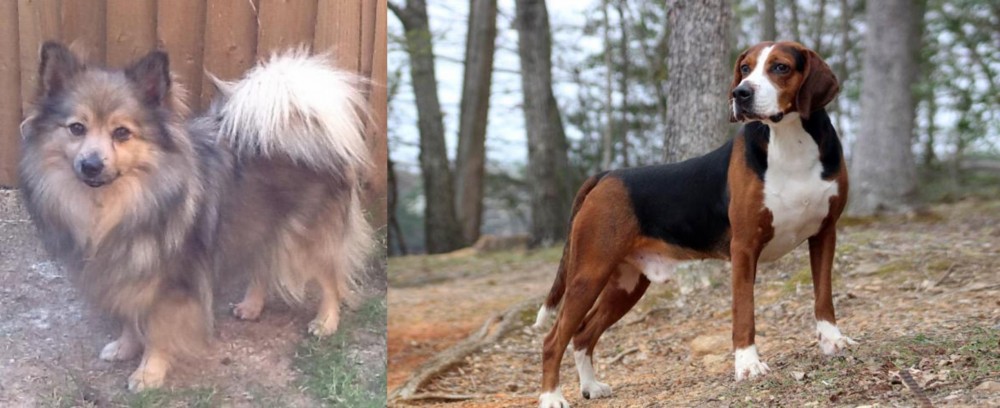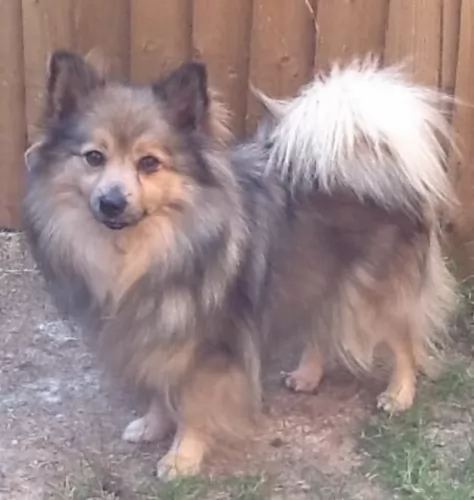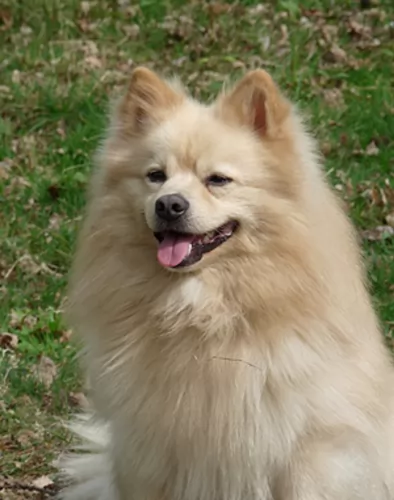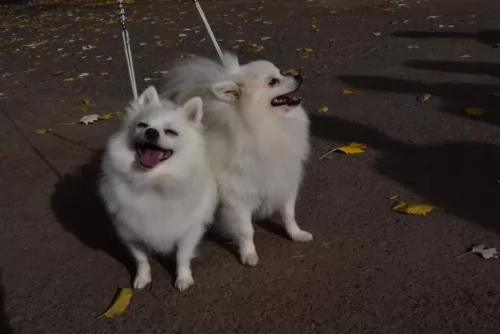 Petzlover
Petzlover German Spitz (Mittel) is originated from Germany but Hamiltonstovare is originated from Sweden. German Spitz (Mittel) may grow 23 cm / 9 inches shorter than Hamiltonstovare. German Spitz (Mittel) may weigh 16 kg / 35 pounds lesser than Hamiltonstovare. Both German Spitz (Mittel) and Hamiltonstovare has almost same life span. German Spitz (Mittel) may have less litter size than Hamiltonstovare. German Spitz (Mittel) requires Moderate Maintenance. But Hamiltonstovare requires Low Maintenance
German Spitz (Mittel) is originated from Germany but Hamiltonstovare is originated from Sweden. German Spitz (Mittel) may grow 23 cm / 9 inches shorter than Hamiltonstovare. German Spitz (Mittel) may weigh 16 kg / 35 pounds lesser than Hamiltonstovare. Both German Spitz (Mittel) and Hamiltonstovare has almost same life span. German Spitz (Mittel) may have less litter size than Hamiltonstovare. German Spitz (Mittel) requires Moderate Maintenance. But Hamiltonstovare requires Low Maintenance
 Originating in Germany, the German Spitz Mittel is an alert, vigilant dog and it is these qualities that made him sought after for working on farms.
Originating in Germany, the German Spitz Mittel is an alert, vigilant dog and it is these qualities that made him sought after for working on farms.
He is no new breed and is the 3rd largest of the five German Spitz varieties. It is believed that the German Spitz descended from the Northern sled and herding dogs which arrived with the Vikings into Europe. When you do research you see that the dogs are mentioned in German literature which dates way back to to 1450 already.
 Bred as a hunting hound, the Hamiltonstovare hails from Sweden, being founded in the late 1800s. He was first exhibited in Sweden in 1886.
Bred as a hunting hound, the Hamiltonstovare hails from Sweden, being founded in the late 1800s. He was first exhibited in Sweden in 1886.
Known also as the Hamilton or the Swedish Foxhound, the dog was developed by Count Adolf Hamilton who was also the founder of the Swedish Kennel Club. The dog’s ancestry includes some German Hounds as well as Harriers and English Foxhounds, and this has ensured he has excellent hunting instincts.
This dog breed got the name Hamiltonstovare in 1921 as a tribute to the person who created the breed and also the founder of the Swedish Kennel Club, Count A.P. Hamilton. The Hamiltonstovare isn’t recognized by the AKC but is recognized by the FCI and is also a member of the Foundation Stock Service. He is recognized by the Kennel Club in the UK as a Hound.
 The German Spitz Mittel is similar in looks to the other sizes of German Spitz. The Mittel is a medium sized dog and stands between 30 and 38cm in height and weighs between 7 and 11kg. You’ll find him in solid colors such as tan, liver, white, fawn, black or a mix of these colors.
The German Spitz Mittel is similar in looks to the other sizes of German Spitz. The Mittel is a medium sized dog and stands between 30 and 38cm in height and weighs between 7 and 11kg. You’ll find him in solid colors such as tan, liver, white, fawn, black or a mix of these colors.
He has a soft woolly undercoat and a long outercoat with a mane-like ruff at the neck. He has a fairly long muzzle, dark eyes, sharp erect ears and a bushy tail which curls over his back.
Affectionate, faithful, and always happy by nature, the German Spitz Mittel is a family companion that wants to be part of everything his human family is up to. He makes a good watchdog. He is alert and has a distrust of strangers.
He gets on well with children in the home and he can also live in peace with other dogs. Because he is an intelligent dog, you won’t have much trouble with training- and socializing him, although he will require a firm, consistent owner and trainer.
Training and socialization are important as there are always some important commands such as sit, stay, come and lie down that you will want him to respond to immediately.
 The Hamilton Hound is a good looking, well proportioned dog with an attractive, 2-layered, shortish, smooth, tri-colored coat of tan, black and white.
The Hamilton Hound is a good looking, well proportioned dog with an attractive, 2-layered, shortish, smooth, tri-colored coat of tan, black and white.
These dogs stand at about 49-61cm in height and they weigh 23 – 27kg. The eyes are brown and the ears are floppy. He is a deep chested dog with a long tail which he carries straight or which is somewhat curved. He has a longish head with a skull that is slightly arched and broad.
Friendly, social and amicable, the even-tempered Hamiltonstovare is a dog that loves to be with his human family. When you look at him you look at him as a friend as he has a calm, intelligent expression about him.
He is a stubborn, non-aggressive dog that is intelligent and this makes it easy to have him trained and socialized to make him obedient and to follow some easy instructions.
He is a very active dog and will love an owner who leads an active, outdoor life. Most Hamiltons love swimming too and he will be thrilled if you plunge in with him on a hot day.
He has always been a hunting dog, and while they love spending time with their human family, he loves the thrill of the hunt. He is a playful dog too, loving to entertain and be entertained, and he gets on well with children.
 People who have owned a German Spitz Mittel are delighted with him, saying that he is such an easy-going, happy dog. He is social and thrives on the interaction he has with his human family.
People who have owned a German Spitz Mittel are delighted with him, saying that he is such an easy-going, happy dog. He is social and thrives on the interaction he has with his human family.
He won’t do well if you simply put him in your backyard and forget about him, using him merely as a watchdog.
The German Spitz Mittel dog is one dog that definitely lives up to the title of man’s best friend. He is social, happy, loving, loyal, playful, entertaining and smart too, and when you treat him the way he deserves, you’ve got the most awesome friend.
 Hamiltonstovares make wonderful companions simply because they’re friendly dogs with stable personalities.
Hamiltonstovares make wonderful companions simply because they’re friendly dogs with stable personalities.
He is actually an ‘all-rounder’ dog – well proportioned and good-looking and with a solid personality to match.
He is lithe and muscled and as a multi-purpose dog, he has been used to follow scents and hunt down prey. These skills as well as his loyal characteristics have made him a versatile, sought after pet.
Another bonus when you own a dog like this is that he is also a low maintenance dog, shedding very little. He is intelligent too and easy to train, and all these qualities make him a wonderful pet to own.
 German Spitz dogs are healthy, and when you shower him with love and attention and good food, you can expect to have him around for up to 15 years of age.
German Spitz dogs are healthy, and when you shower him with love and attention and good food, you can expect to have him around for up to 15 years of age.
Of course, as with any other healthy dog breeds, there are always one or two common dog illnesses that your dog may get. These include hip dysplasia and eye diseases. If you notice symptoms that indicate possible joint issues with your pet, get him to the vet immediately.
Patellar Luxation for instance occurs when your dog’s kneecap is dislocated. It is more common in toy breeds like the German Spitz. It can be painful for your pet and lead to lameness. If your dog has problems with his hip, it can actually force the patella out of its groove, which is a secondary condition.
 Every dog has different genetic make ups that affect them and they have different susceptibilities to illnesses. The average life expectancy of a Hamiltonstovare is between 10 and 13 years when he is looked after and well nourished with top quality food.
Every dog has different genetic make ups that affect them and they have different susceptibilities to illnesses. The average life expectancy of a Hamiltonstovare is between 10 and 13 years when he is looked after and well nourished with top quality food.
Some things to look out for are hip dysplasia, cancer, bloat and obesity.
Look out for obesity in your pet because just like with people, obesity leads to other diseases and complications in dogs such as diabetes, respiratory disorders, osteoarthritis and hypertension.
If your dog needs to lose weight, and you just don’t know how you’re going to deny him the treats he loves, speak to your vet who can even work out a weight management program for him.
Cancer is a formidable threat to all dog breeds. The most obvious sign that your dog could have cancer is abnormal swelling that gets larger under the skin. The idea is get get the lump removed and biopsied as soon as possible. Loss of appetite, weight loss, sores that don’t heal and bleeding or discharge are all signs of cancer.
 You can help reduce loose hairs with your German Spitz by brushing his thick coat twice a week. It’s a good time to also inspect your dog for ticks and fleas.
You can help reduce loose hairs with your German Spitz by brushing his thick coat twice a week. It’s a good time to also inspect your dog for ticks and fleas.
Your German Spitz Mittel isn’t the most active dog, but he will still need regular exercise. Going on a walk is good for both you and him. He is a mentally sharp dog too and these walks keep him both physically- and mentally fit. He also loves ball games.
Every dog deserves the best food, and if you feed your German Spitz Mittel with a commercially manufactured dog food, make sure its one of the top quality ones. You want to avoid foods packed with preservatives, colorants and fillers. You want dog foods with minerals and vitamins with high protein and ingredients such as Omega 3 and 6 to promote health skin.
There are also some dog foods which have ingredients in them such as polyphosphates. Ingredients like this keep your dog’s teeth clean.
Try and also give him some cooked rice, vegetables and chicken mixed into his kibble from time to time as well as raw meat. He should never be without fresh, cool water.
 The Hamiltonstovare has a double coat but even so, he is a low maintenance breed that will simply require a brush twice a week to remove dead and loose hair.
The Hamiltonstovare has a double coat but even so, he is a low maintenance breed that will simply require a brush twice a week to remove dead and loose hair.
Because he has floppy ears, it is important to check his ears because too much wax and debris can lead to a painful infection.
This is a high energy dog who will need the right amount of exercise as well as mental stimulation to be at his best. A nice walk every day will be excellent for him as well as the usual ball games in the garden.
If you get your Hamilton puppy from a breeder, it would be wise to stick to the same food they were feeding your puppy with. Suddenly changing his good could cause digestive upsets.
Every Hamilton requires top quality food that meets all his nutritional requirements. If you give him commercially manufactured food, make sure to follow the instructions with regards to the amount of food you give him as he can put on too much weight.
These dogs are known to suffer with bloat, so rather give him smaller meals than one large meal a day. Your Hamilton should never be exercised immediately after eating a meal. Remember to always ensure a bowl of fresh, cool water is always available.